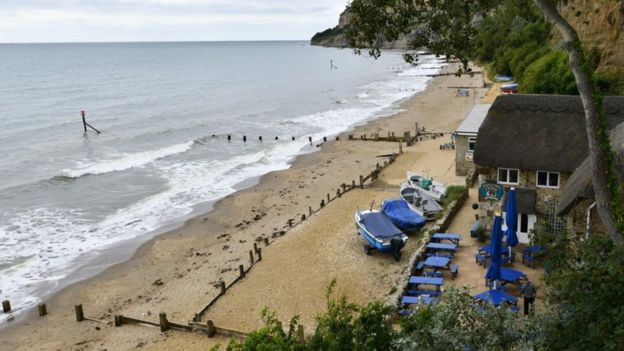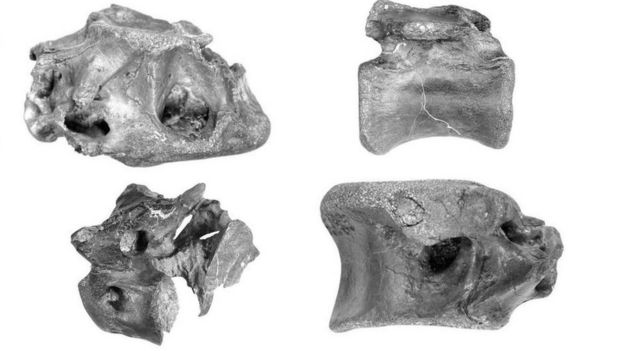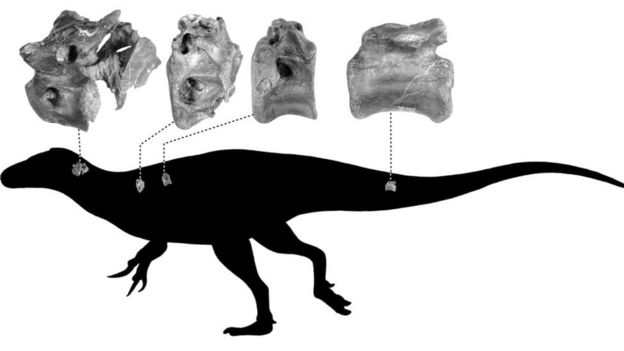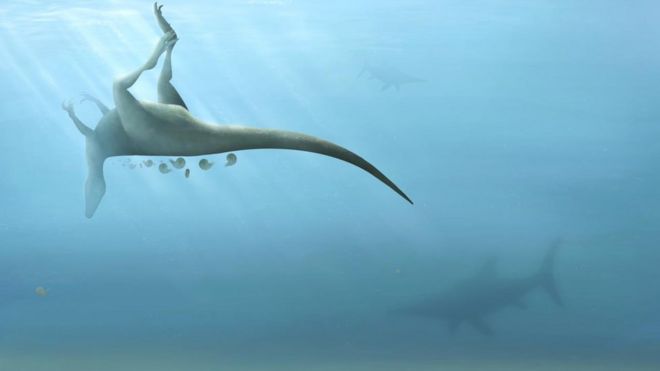A new species of dinosaur has been discovered on the Isle of Wight.
Palaeontologists at the University of Southampton believe four bones found at Shanklin last year belong to a new species of theropod dinosaur.
It lived in the Cretaceous period, 115 million years ago, and is estimated to have been up to 4m (13ft) long.
It has been named Vectaerovenator inopinatus and belongs to the group of dinosaurs that includes Tyrannosaurus rex and modern-day birds.
The name refers to the large air spaces found in some of the bones - from the neck, back and tail of the creature - which is one of the traits that helped the scientists identify its theropod origins.
These air sacs, also seen in modern birds, were extensions of the lung, and it is likely they "helped fuel an efficient breathing system while also making the skeleton lighter", the University of Southampton said.

The fossils were found in three separate discoveries in 2019 and handed in to the nearby Dinosaur Isle Museum at Sandown, where they are being displayed.
Robin Ward, a regular fossil hunter from Stratford-upon-Avon, was visiting the Isle of Wight with his family when they made their discovery.
"The joy of finding the bones we discovered was absolutely fantastic," he said.
James Lockyer, from Spalding, Lincolnshire, was also visiting the island when he found another of the bones.

"It looked different from marine reptile vertebrae I have come across in the past," he said.
"I was searching a spot at Shanklin and had been told, and read, that I wouldn't find much there.
"However, I always make sure I search the areas others do not, and on this occasion it paid off."
Paul Farrell, from Ryde, added: "I was walking along the beach, kicking stones and came across what looked like a bone from a dinosaur.
"I was really shocked to find out it could be a new species."
'Delicate skeleton'
Chris Barker, who led the University of Southampton study, said: "We were struck by just how hollow this animal was - it's riddled with air spaces.
"Parts of its skeleton must have been rather delicate.
"The record of theropod dinosaurs from the 'mid' Cretaceous period in Europe isn't that great, so it's been really exciting to be able to increase our understanding of the diversity of dinosaur species from this time.
"You don't usually find dinosaurs in the deposits at Shanklin as they were laid down in a marine habitat. You're much more likely to find fossil oysters or drift wood, so this is a rare find indeed."
It is likely that the Vectaerovenator lived in an area just north of where its remains were found, with the carcass having washed out into the shallow sea nearby.
The university findings are due to be published in the journal Papers in Palaeontology and co-authored by those who discovered the fossils.

Latest Stories
-
Gold Fields Ghana Foundation challenges graduates to maximize benefits of community apprenticeship programme
13 mins -
GBC accuses Deputy Information Minister Sylvester Tetteh of demolishing its bungalow illegally
24 mins -
Boost for education as government commissions 80 projects
35 mins -
NAPO commissions library to honour Atta-Mills’ memory
46 mins -
OmniBSIC Bank champions health and wellness with thriving community walk
48 mins -
Kora Wearables unveils Neo: The Ultimate Smartwatch for Ghana’s tech-savvy and health-conscious users
52 mins -
NDC supports Dampare’s ‘no guns at polling stations’ directive
55 mins -
Police officer interdicted after video of assault goes viral
1 hour -
KNUST’s Prof. Reginald Annan named first African recipient of World Cancer Research Fund
1 hour -
George Twum-Barimah-Adu pledges inclusive cabinet with Minority and Majority leaders
2 hours -
Labourer jailed 5 years for inflicting cutlass wounds on businessman
2 hours -
Parliament urged to fast-track passage of Road Traffic Amendment Bill
2 hours -
Mr Daniel Kofi Asante aka Electrician
2 hours -
Minerals Commission, Solidaridad unveils forum to tackle child labour in mining sector
2 hours -
Election 2024: Engagement with security services productive – NDC
2 hours

